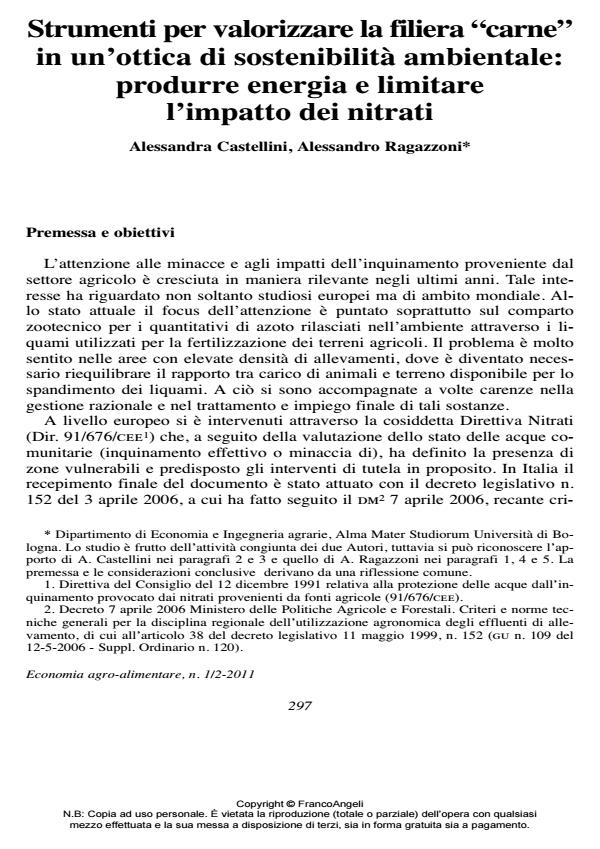Energy production and nitrates control for the environmental sustainability and the value enhance of the meet chain
Journal title ECONOMIA AGRO-ALIMENTARE
Author/s Alessandra Castellini, Alessandro Ragazzoni
Publishing Year 2011 Issue 2011/1-2
Language Italian Pages 21 P. File size 141 KB
DOI 10.3280/ECAG2011-001014
DOI is like a bar code for intellectual property: to have more infomation
click here
Below, you can see the article first page
If you want to buy this article in PDF format, you can do it, following the instructions to buy download credits

FrancoAngeli is member of Publishers International Linking Association, Inc (PILA), a not-for-profit association which run the CrossRef service enabling links to and from online scholarly content.
In 1991 the eu implemented the Nitrates Directive (Council Directive 91/676/eec) concerning the protection of waters against pollution caused by nitrates from agricultural sources. The compliance to its requirements represent today a critical step for the Italian farms, particularly those involved in the livestock business sector which suffers also the burden of a worrying market crisis. Difficulties for the farms involve economic and technical aspects. First are linked to the added costs deriving from the respect of the rules in terms of nitrogen burden per area and the sewages disposal. The technical problems are mainly represented by the new classification of the areas in vulnerable (vzs) and non vulnerable zones (nvzs). This facts have represented an important obstacle for farms’ management, particularly if they are located in vzs because it has became necessary find new solutions to spread the farm sewages. The paper offers an empirical analysis aimed at trying to optimize the compliance procedures to this directive for a livestock farm, trough the predisposition of an economic account for two typical chains: the red (bovine) and pork meat production. The calculation comprehends all the phases from the meat production to the sewages handling and management after a denitrification and the nitrogen storage. The evaluation consider different alternative systems. Through this process it could be possible obtain the commutation of the bovine and swine sewages, representing an expensive burden, in a new resource for the farm. This fact permits to achieve also an environmental result in terms of a pollution restraint and an economic advantage as raw material for energetic transformation. Finally the Authors complete the paper with some reflections.
Keywords: Nitrates Directive, sewages, energy production, firm accounting
Jel codes: Q120
Alessandra Castellini, Alessandro Ragazzoni, Strumenti per valorizzare la filiera "carne" in un’ottica di sostenibilità ambientale: produrre energia e limitare l’impatto dei nitrati in "ECONOMIA AGRO-ALIMENTARE" 1-2/2011, pp , DOI: 10.3280/ECAG2011-001014